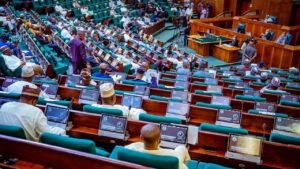NGO calls on leaders to shun corruption in their practices
By Matthew Denis
The Priests Peace Justice Initiative (PPJ) has called on religious, economic and political leaders across all organizations in the society to shun, speak, and to stand against corruption.
PPJ which is the Social Arm of the Palace of Priest Assembly made this call during her One-Day Public Presentation of PPJ year 2 report of the Mobilizing Christians Against Corruption (MOCAC 2.0): Reflecting on Progress and Paving Way for the Third Year.
In a remark of the report titled “Pioneering Pentecostals Involvement in the Fight Against Corruption in Nigeria: A Harvest of First”, the Project Director, Pastor (Dr) Ejiro Igbuzor, said that the problem of corruption is a global one.
“Over the years several scholars, development workers, activists, politicians, international organisations, public affairs organizations and the general public, have given attention to the problem of corruption and its effect on society. The problem is not new to humankind, even though it has reached unprecedented proportions in recent years, is as old as society itself, and it cuts across nations, cultures, races and classes of people.
“Corruption poses significant challenges to economic development, social justice, and stability. It has been argued that one of the major obstacles to the development of poor countries is corruption. Corruption is undoubtedly one of the greatest challenges of our time, a challenge that is not only leading to the impoverishment and loss of lives, but also straining the stability of society.”
Igbuzor stressed that there has been a lot of focus on how to mitigate the impact of corruption.
“Strategies, programs and agencies have been put in place to address the problem of corruption. But the challenge remains.
“Despite the plethora of legislations and agencies fighting corruption in a country, corruption has remained widespread, and pervasive, and that is because of failure to utilise universally accepted and tested strategies, disconnect between the posturing of leaders and their conduct, lack of concrete sustainable anti-corruption program, and the failure to locate the anti corruption struggle within a broader struggle to transform and change society for better.”
The Project Director stressed the Initiative’s commitment to fighting corruption and working alongside pentecostals and religious leaders, stating that more people are beginning to see the need to join in the fight.
“The record as shown reveals that religious groups in Nigeria, in time past, do not engage in the fight against corruption but now, many religious groups in Nigeria, especially those working in the behavioral change comfort, with the support of McArthur Foundation have become agents of change, engaging in anti corruption initiatives. It is within this context that the SHUN corruption project was centralised.
He disclosed that the first phase of the project, which was implemented from January 2018 to August 2021, showed potential for behavioural change by Pentecostals to engage in social issues and join the fight against corruption. And that the year 2 report chronicles the PPJ’s pioneering efforts in mobilizing Pentecostals in the fight against corruption in Nigeria.
Speaking briefly on the achievement of the Initiative, he said that the Priests Peace Justice Initiative (PPJ) has trained 2,892 pentecostals, 1886 additional pentecostals have endorsed the path on transparency and accountability. 91 churches have established a social arm of the church to fight corruption, and address other social issues in society.
He also said that the Initiative has established 61 anti-corruption platforms, in addition to the three major ones, “Ministers against corruption,” “Christian women against corruption,” and “Youth vanguard against corruption.”
“We felt the need that the fight against corruption is not merely a civic duty, but it is also a fulfillment of the dual mandate given to the church by our Lord Jesus Christ, to minister to people spiritually and physically including In the social dimension of the church.”
The Project Director said that they will continue to focus on the sustainability of the anti-corruption platforms that the Initiative has established, and produce a manual for the operationalization and management of the social arm of the church which can be used beyond the project lifespan.
He said the Initiative will build the capacity of leaders to professionalize and manage the social arms already established and continue to mainstream anti-corruption messages.




